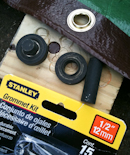
| Here is how we built our hutch |
Hutch Construction We bought treated lumber (4x4, 2x4, 2x6 for $107) at 84Lumber, and four 4'x8' plywood sheets at HomeDepot ($95). We also got various hardware: screws, hex nuts and washers at HomeDepot ($52).
At the end, we painted the hutch to match our other buildings. The natural photoperiod is extended by double-tube fluorescent lighting fixture for wet rooms ($62 at HomeDepot) which works by photocells and outdoor timer to extend the lighting to 16 hours per day. Thus, we can breed the rabbits all year long.
For convenience we added two utility outlets. We added a bad-weather protecting curtain out of transparent woven poly 9'-10” Wide ($2.65/per linear ft.; item# 1340) from Charley's Greenhouse. This will protect the rabbits form strong wind blowing rain into the cages, but letting light through. Since the wide overhang prevents this pretty much from happening, we will use the curtain only when there is really bad weather.
We had to add some grommets to afix the curtain properly.
In order to prevent temperatures to drop below 20 F, we installed a heater, Q-Mark 2512W Electric Baseboard Heater, ($40.80). We are regulating the heater with a thermostat, 20 On/30 Off Thermo Cube from SmartHome ($18.99). Cages
The cage comes with all the parts to assemble them.
The cages' floor is a wire mesh which is hard on the rabbits hunches. Thus, we add cardboard pieces as mats (cardboard should not cover the entire floor).
|











